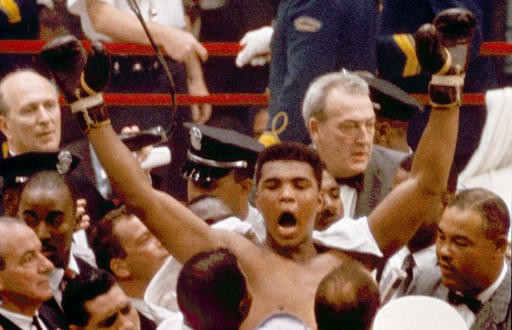Popular Reads
Top Results
Can't find what you're looking for?
View all search resultsPopular Reads
Top Results
Can't find what you're looking for?
View all search resultsMuhammad Ali is the greatest counter to Trump
The logic of Ali's success implied uppity in perpetuity. Women. Blacks. Hispanics. Muslims. Asians. Gays. If he could spout like that, fight like that, win like that, why couldn't others? Even uppity nations, the world's Mexicos and Chinas, which Trump vows to put back in their place, drew inspiration from him.
Change text size
Gift Premium Articles
to Anyone
 In this Feb. 25, 1964, file photo, Muhammad Ali, or Cassius Clay at the time, strikes a familiar pose as he shouts "I am the greatest," as he leaves the ring, arms raised, following his defeat of former heavyweight boxing champion Sonny Liston, in Miami Beach, Fla. Ali, the magnificent heavyweight champion whose fast fists and irrepressible personality transcended sports and captivated the world, has died according to a statement released by his family Friday, June 3, 2016. He was 74. (Associated Press/-)
In this Feb. 25, 1964, file photo, Muhammad Ali, or Cassius Clay at the time, strikes a familiar pose as he shouts "I am the greatest," as he leaves the ring, arms raised, following his defeat of former heavyweight boxing champion Sonny Liston, in Miami Beach, Fla. Ali, the magnificent heavyweight champion whose fast fists and irrepressible personality transcended sports and captivated the world, has died according to a statement released by his family Friday, June 3, 2016. He was 74. (Associated Press/-)
I
t's just a twist of fate, of course, that "the Greatest" should die in the middle of Donald Trump's misbegotten campaign to Make America Great Again. But humans get a kick out of coincidence, and History indulges us time and again.
Muhammad Ali, once America's most famous braggart, embodied much of what the Trump campaign has been organized to denigrate, delegitimize and contest. Ali's incessant claims of greatness were gigantic. They had to be: He was inflating millions of bruised and depleted egos in addition to his own.
Trump is America's most famous braggart now. He's a great businessman. He makes great deals. He'll be "the greatest jobs president God ever created." In his own way, Trump may even imagine his self-administered superlatives performing a similar service to Ali's, raising up a broken and battered people while advancing himself.
Ali was the most uppity man in the land at a time when up was the only direction that he and those who cheered him on could countenance. He didn't claim to be the white man's equal, as the civil rights movement taught. He simply said he was the greatest. By definition that meant he was better than any man on earth -- pick your color. He was a compact revolution, a confluence of physical power, beauty, grace, wit and explosive danger. White people by the millions detested him, some for his show of boundless arrogance, others because they feared that the radical, alien future that Ali almost singularly occupied might somehow make room for many more.
The logic of Ali's success implied uppity in perpetuity. Women. Blacks. Hispanics. Muslims. Asians. Gays. If he could spout like that, fight like that, win like that, why couldn't others? Even uppity nations, the world's Mexicos and Chinas, which Trump vows to put back in their place, drew inspiration from him.
In his statement on Ali's death, President Barack Obama summoned the youthful Ali, the radical, rather than safely dwelling on the fighter's later years, by which time the nation that had simultaneously battled and cheered Ali had thrown its exhausted arms around him. It's doubtful that Obama, regularly cautious around race, would have done so earlier in his administration.
But with Trump breaking the racial sound barrier, promising to deport Hispanics and bar Muslims, winning the hearts of avowed white nationalists with his promise to recall their better days, the president isn't holding back. In his statement on Ali, Obama described the boxer's attitude:
“I am America,” he once declared. “I am the part you won’t recognize. But get used to me – black, confident, cocky; my name, not yours; my religion, not yours; my goals, my own. Get used to me.”
Yes, get used to me. Get used to me even in the Oval Office.
Obama made the connection explicit. In the same statement, after citing Ali for standing his ground in the turbulent 20th century, the president said, "His victory helped us get used to the America we recognize today."
Ali's journey from radical threat to avuncular hero tells us something about Trump's likelihood of success. After Ali's death, Republican Senate leader Mitch McConnell issued a statement calling him one of the "most beloved" athletes of the 20th century and claiming him as a native son of Kentucky. Ali is now viewed as an exemplar of the nation's pluralistic creed. Culturally, he's transcendent. (Who would have guessed, 50 years ago, that Bill Cosby would be the pariah and Ali the beloved?) Politically, Ali, like Obama, is mainstream.
Trump, Ali's contemporary, spent time in the ring himself, although his was the make-believe world of entertainment wrestling, where fakery is the requisite skill. Trump, too, is self-invented. But Ali worked a truer, harder ring. In death, Ali will continue to make claims on the future. In life, Trump is on a journey to the past. His nostalgia isn't entirely racial. (It's industrial, and sexual, too.) But on race, he's chasing Ali's ghost around the ring, swinging wildly, hoping to land one last punch.
***
The author writes editorials on politics and domestic policy. He was previously executive editor of the Week.
---------------
We are looking for information, opinions, and in-depth analysis from experts or scholars in a variety of fields. We choose articles based on facts or opinions about general news, as well as quality analysis and commentary about Indonesia or international events. Send your piece to community@jakpost.com.









